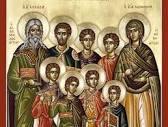
The extract from the Second Book of Maccabees was written at some point between 150 and 120 BC, by an Egyptian Je living in Hellenistic Egypt - probably in Alexandria. It is independent of the First Book of Maccabees and tells the story of the revolt of Judas Maccabeus and his family against the oppressive rule of the Seleucid King Antiochus IV Epiphanes. He had instigated a persecution of the Jews, desecrating the temple and forbidding the rituals of Jewish worship and observance. Pious Jews resisted courageously and today’s account gives a fine example of this. One important point about the story is that it demonstrates a growing belief in the life after death, as the youngest son attested. Previously Jews did not believe in an afterlife but rather a descent into somewhere called Sheol, a place of darkness, somewhat like the Greek Hades.
In contrast to the heroic Maccabees,the Sadducees were in the upper echelons of Jewish society. They controlled the Temple, which had become the centre of Jewish society. Their members formed the priesthood and occupied social and political roles. They maintained cordial relations with the Romans and probably were corrupt. They differed from the pharisees in that they did not believe in the resurrection of the body after death. Their challenge to Jesus was contemptuous and somewhat childish. Their beliefs precluded them from having any idea about a different life beyond the grave; they could only think in terms of the world they knew.
Jesus answered them with a respect which they had not shown to him. Even the scribes who usually questioned him were impressed (Luke 20:39-40). In the month of November, when we remember our loved ones, there is great consolation in his words: ”Now he is God not of the dead but of the living: for to him all are in fact alive.” (Luke 20:38-39)